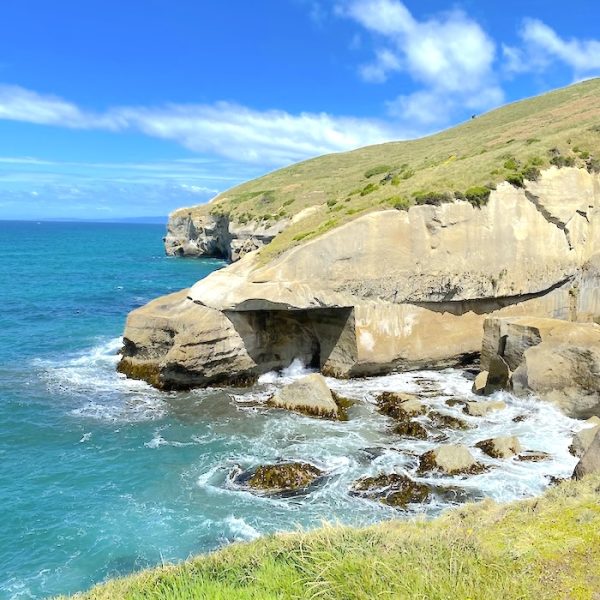
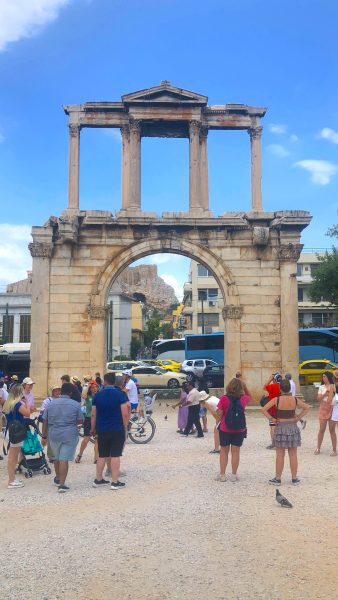
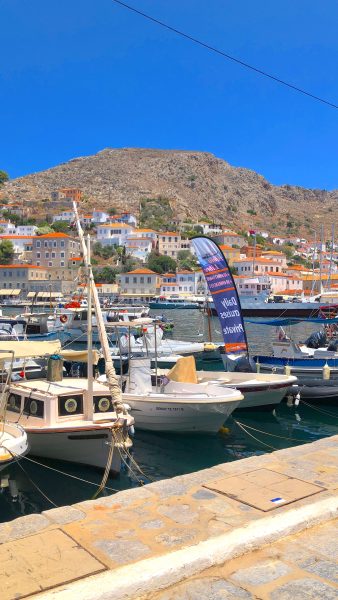
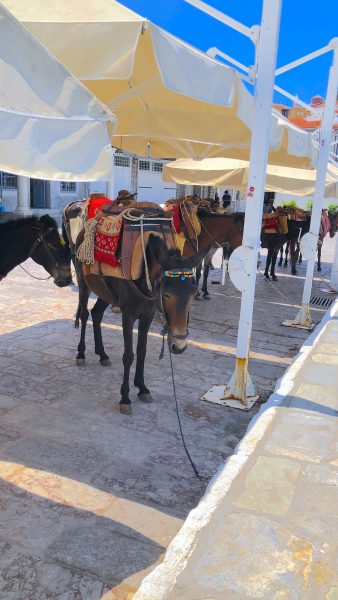
What to Expect in Greece
From ancient ruins to island beaches, here’s all the random-but-useful stuff you should know before rocking up in Greece, like money, plugs, and just how hot it actually gets.
- Money: Greece runs on the Euro (€), and most places happily take card, especially in cities and touristy spots. BUT don’t rely on it 100%. Always carry a little bit of cash for random buses, tiny bakery runs, or that one taverna in the middle of nowhere that only takes coins and vibes. Trust me, it’ll come in handy.
- Plugs: They use Type F plugs here, those round two-pin ones used across most of Europe. If you’re coming from outside the EU, grab a universal adapter so you’re not stuck with a dead phone and no Google Maps in the middle of Athens. (Also: charge your stuff before ferry rides. You’ll thank me later.)
- Capital: Athens is the capital and it’s chaotic in the best way. Think: ancient ruins next to graffiti-covered cafes, a million scooters, and sunsets over the Acropolis that’ll make you emotional for no reason. Most people start or end their trip here and it’s definitely worth more than just a layover.
- Time Zones: Greece runs on Eastern European Time (UTC+02:00), and during summer (from late March to late October), they bump forward to UTC+03:00 for daylight saving. Translation: extra-long summer evenings = more time for late dinners, island strolls, and doing absolutely nothing.
- Climate: Hot. Like actually hot. Greece has a classic Mediterranean climate, dry, sunny summers and mild winters. If you’re going in July or August, expect to live in swimmers and melt slightly every time you step outside (in a good way). Athens gets especially sweaty thanks to all the concrete, while the islands feel a bit breezier. And fun fact: winter in Greece is no joke either, some parts even get snow! So maybe don’t pack just linen if you’re visiting in January.
- Best Time to Visit: Really depends what you’re looking for, but peak season is July and August. I would say your best bet if your looking for great weather, but not too hot and not too busy, would be to go in the should seasons of May/June or September/October.
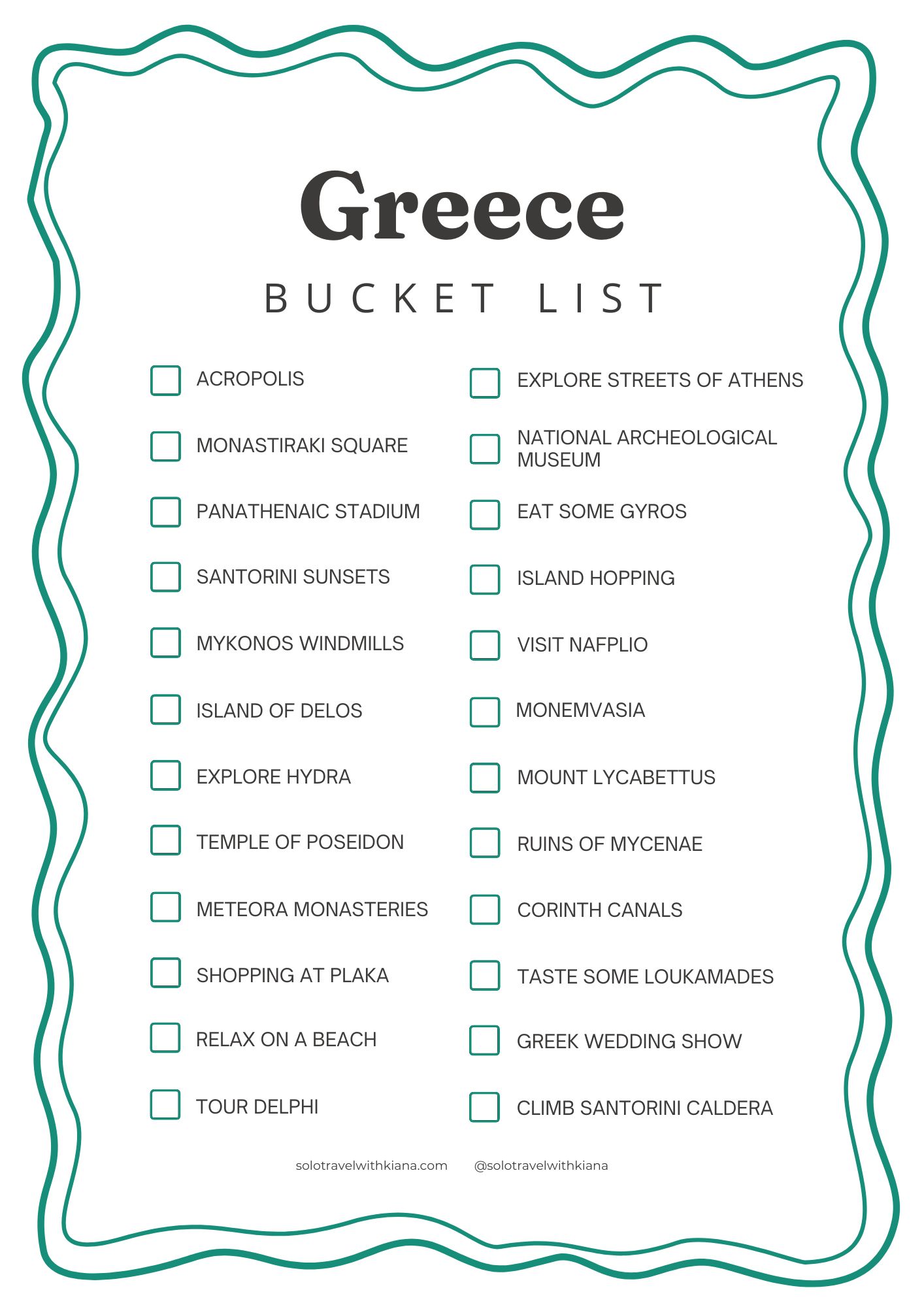
Bucket List Experiences
What It’ll Cost You
Greece is surprisingly friendly on the wallet, especially if you stick to hostels, gyros, and ferry deals. Here’s a rough guide to what you’ll spend as a budget traveller, so you can plan smarter and maybe even afford another island hop.
| Category | Budget Cost (Per Day or Per Item) | Notes |
|---|---|---|
| Accommodation | €20–€35 per night (hostel dorm) | Prices vary by island/city. Athens is cheaper, Santorini is $$$ |
| Food | €10–€20 per day | Gyros/snacks: €2–€4, casual meals: €6–€10 |
| Transport (Local) | €1.20–€2.00 per metro/bus ride in cities | Consider buying a 24hr pass in Athens if you’re exploring lots |
| Ferries (Island Hops) | €20–€60 per ride | Book in advance for cheaper seats and consider buying a Eurrail Ferry Pass |
| Activities | €5–€20 per attraction | Acropolis: €10–€20, some museums offer free entry or tourist and youth discounts |
| Sunbed Rental | €0–€10 per day | Many beaches are free, but sunbeds often cost unless you order drinks |
| Shopping/Souvenirs | €5–€15 (depends on your self-control) | Markets are cheaper than tourist shops, haggle if you feel bold! |
| Coffee | €1.50–€3.50 | Iced coffee is a Greek essential. You’ll be addicted by day two. |
| Water | €0.50 per bottle | Tap water is safe in Athens, not always on the islands |
| Sim Card/Data | €10–€20 (for a couple of GBs) | Local SIMs (like COSMOTE or Vodafone) are cheap and easy to buy |
| Total Daily Budget | €40–€60/day | Backpacker-level. Splurge days = more, chill days = less |
Pro Tip: If you’re doing a lot of activities, look into combo deals or discount passes. Every little bit helps!

Getting Around Greece
Greece has a bunch of transport options, and honestly, getting around is pretty easy once you get the hang of it. Whether you’re zipping through Athens or ferry-hopping your way across the islands.
- Athens Public Transport: Getting around Athens is super chill thanks to its solid public transport network. The Athens Metro is clean, reliable, and connects most major tourist spots, like the Acropolis, Monastiraki, and Syntagma Square. If you’re staying further out, buses are a good option and will usually link you to the nearest metro station. Down by the coast (like Piraeus), there’s also a tram system that cruises along the waterfront. Perfect for beach day trips.
- Taxis & Rideshares: Not feeling public transport? Taxis are everywhere. They’re more expensive, but they’re super handy, especially if you’re doing something chaotic like catching a 5am ferry (been there). You can book them using apps like Uber or Free Now. Just a heads up: in Greece, all rideshare drivers are registered yellow taxis, so don’t freak out when a classic yellow cab pulls up even though you ordered an Uber.
- Car Hire: Hiring a car is a solid option if you’re exploring mainland Greece and want full freedom. It’s especially useful for reaching harder-to-get-to places like Delphi, Meteora, or smaller beach towns. Just make sure you’re comfy driving on narrow roads with hairpin turns and check if your accommodation includes parking.
- Trains Across the Mainland: Greece does have a country-wide train network, but it’s not the most extensive. It’s decent if you’re travelling between bigger cities, like Athens to Thessaloniki, but not great for smaller towns or off-the-beaten-path spots. Still, it’s affordable and scenic if it lines up with your route.
- Island Hopping: This is where Greece really shines. You could fly to most of the major islands, but where’s the fun in that? Ferries are part of the full Greek travel experience, and watching the islands appear in the distance as you cruise across the Aegean is unmatched. There are heaps of different ferry companies, but your best friend is the Ferryhopper app. It shows all the ferry routes, times, prices, and travel durations in one place, so you can easily compare and book without getting overwhelmed. If you’re planning to hit up lots of islands and don’t mind taking slower/budget ferries, you could look into the Eurail Greek Islands Pass. You choose how many travel days you want, and then you can book through their partnered ferry companies. Just a note -this pass only covers two ferry operators, so it might not work if you’re going to smaller or lesser-known islands. Always check the routes before committing.

Staying Safe in Greece
Greece is generally a safe and welcoming country, with friendly locals, a stable government, and chilled vibes almost everywhere you go. But like any tourist hotspot, it’s still worth knowing what to look out for so you can enjoy more souvlaki and fewer dramas.
- Emergency Numbers: The general emergency number in Greece is 112. It’ll connect you to police, ambulance, or fire services. For non-emergencies, you can contact local police stations directly. There’s also a Tourist Police specifically there to help travellers with minor issues (like lost documents or stolen stuff). They’re available 24/7 at 171, and they speak English. You’ll find Tourist Police offices in major cities and popular islands.
- Petty Theft & Pickpocketing: Greece is safe overall, but petty theft can be a problem in busy tourist areas, especially on buses, trains, and around popular attractions. Keep your bag zipped and close to you, and avoid leaving valuables in outer pockets or hanging off your backpack. Sadly, bag snatching and even luggage slashing do happen, so stay alert in crowded spots.
- Bushfires & Summer Conditions: Greece has bushfires most summers, but unless you’re road-tripping through the mainland countryside, you’ll probably be unaffected. Cities and islands are rarely in danger zones, though fires can sometimes cause road closures or delays. Keep an eye on local news if you’re travelling around inland.
- Heatwaves & UV: Summer in Greece = HOT. Heatwaves are becoming more common, especially in July and August, and they’re no joke. Drink lots of water
- Wear light, breathable clothing
- Stay indoors or in the shade during the hottest part of the day
- Don’t skip the sunscreen! The UV is brutal, and you’ll burn fast, even on cloudy days.
- Visa & Entry Info: Greece is part of the Schengen Area, which means Australians (and other eligible passport holders) can visit for up to 90 days without a visa (within any 180-day period). Always check your country’s travel website for the most up-to-date info. Heads up: From October 2025, the European Entry/Exit System (EES) will kick in for non-EU travellers. It means you’ll be logged in and out every time you enter or leave Schengen countries, so just something to keep on your radar.

Uncover the Secrets of Delos Island: A Self-Guided Tour
Uncover the Secrets of Delos Island: A Self-Guided Tour Is Delos Worth Visiting? Short answer:…
11 Ultimate Things to Do on Rottnest Island (Wadjemup) for an Unforgettable Adventure
11 Ultimate Things to Do on Rottnest Island (Wadjemup) for an Unforgettable Adventure What is…
Self-Guided Walking Tour of Melbourne’s Best Laneways
Self-Guided Walking Tour of Melbourne’s Best Laneways So… what’s the hype with Melbourne’s laneways? If…
Where to Stay in Queenstown (If You’re Broke But Still Want Nice Views)
Where to Stay in Queenstown (If You’re Broke But Still Want Nice Views) Queenstown Accommodation…
Tunnel Beach, Dunedin: How to Visit This Hidden Gem
Tunnel Beach, Dunedin: How to Visit This Hidden Gem Tunnel Beach is hands down one…
Milford Sound: Everything You Need to Know Before Visiting
Milford Sound: Everything You Need to Know Before Visiting What is Milford Sound? First off,…















